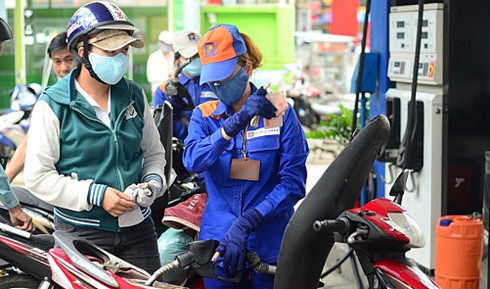Vietnam proposes drastically increasing ‘environment tax’ on petrol
 |
The bill, prepared by the Ministry of Finance, suggests lifting the maximum environmental protection tax on gasoline to VND8,000 per liter from the current VND3,000.
Higher tax rates for other fuel products, such as diesel and fuel oil, are also proposed in the draft amendment.
The finance ministry is scheduled to collect feedback for the bill in April and submit a final draft to government in May.
The government will then officially present the bill to the lawmaking National Assembly in June, which will assign various committees to appraise the draft before deciding its fate in October.
The environmental protection tax is intended to solicit resources from the public and increase state revenue in order to resolve environmental issues, according to the finance ministry.
The ministry revealed that revenue from this kind of tax has steadily increased, from VND11,160 billion (US$498.21 million) in 2012 to VND42,393 billion ($1.89 billion) in 2016.
The tax accounted for 1.5 percent to 4.1 percent of the state’s total budget collection, making up 0.3 percent to 0.9 percent of the country’s GDP.
With the tax rate for gasoline likely to more than double later this year, local consumers are worried that fuel prices will soon skyrocket.
A92 gasoline, the country’s most widely used fuel, currently sells for VND17,310 a liter under the VND3,000 environment tax.
Should the new tax rate be applied, the price would rise to more than VND22,000 a liter, according to analysts.
However, Ngo Tri Long, a price management expert, has said that VND8,000 a liter is only the proposed ceiling tax rate for gasoline, and that the finance ministry does not necessarily have to immediately apply it after it is approved.
Even so, the proposed ceiling rate is so high that it will surely impact consumers and the market in general, Long added.
Several regulatory bodies, including the foreign and justice ministries and the Vietnam Chamber of Commerce and Industry have also expressed concerns about the negative impact the new tax rate will have on the economy.
Long therefore suggested that the finance ministry focus on measures to reduce tax losses in the fuel sector, at a time when the state’s budget is suffering huge losses from smuggled fuel.
What the stars mean:
★ Poor ★ ★ Promising ★★★ Good ★★★★ Very good ★★★★★ Exceptional
Latest News
More News
- NAB Innovation Centre underscores Vietnam’s appeal for tech investment (January 30, 2026 | 11:16)
- Vietnam moves towards market-based fuel management with E10 rollout (January 30, 2026 | 11:10)
- Vietnam startup funding enters a period of capital reset (January 30, 2026 | 11:06)
- Vietnam strengthens public debt management with World Bank and IMF (January 30, 2026 | 11:00)
- PM inspects APEC 2027 project progress in An Giang province (January 29, 2026 | 09:00)
- Vietnam among the world’s top 15 trading nations (January 28, 2026 | 17:12)
- Vietnam accelerates preparations for arbitration centre linked to new financial hub (January 28, 2026 | 17:09)
- Vietnam's IPO market on recovery trajectory (January 28, 2026 | 17:04)
- Digital economy takes centre stage in Vietnam’s new growth model (January 28, 2026 | 11:43)
- EU Council president to visit Vietnam amid partnership upgrade (January 28, 2026 | 11:00)
















 Mobile Version
Mobile Version